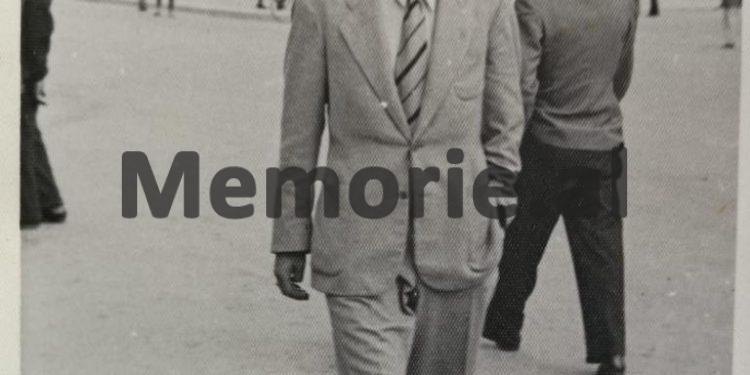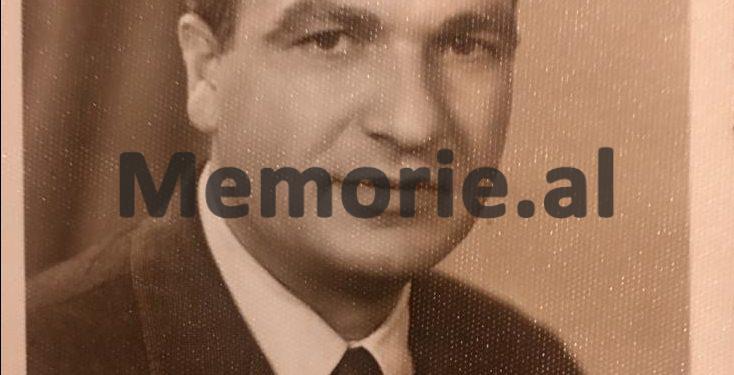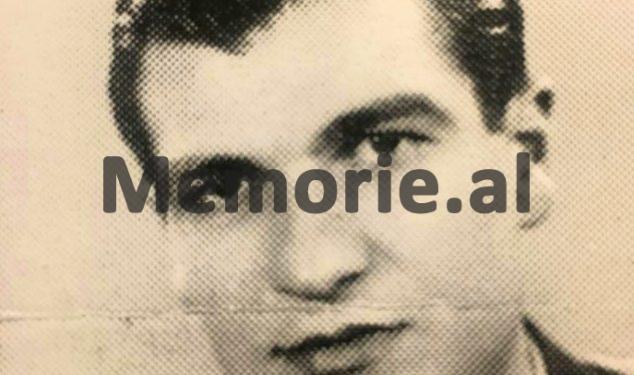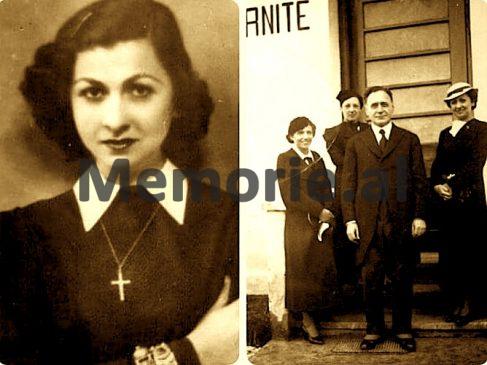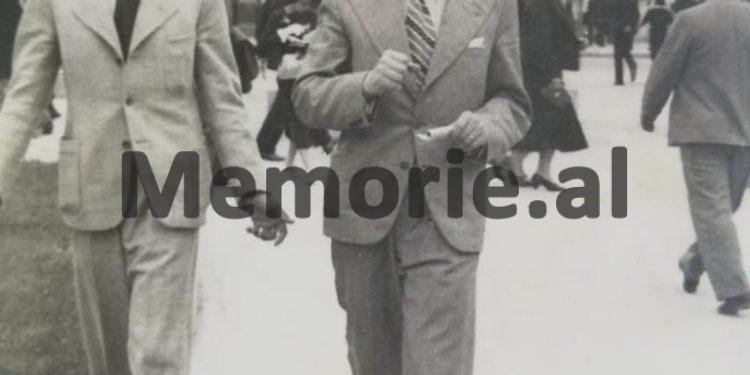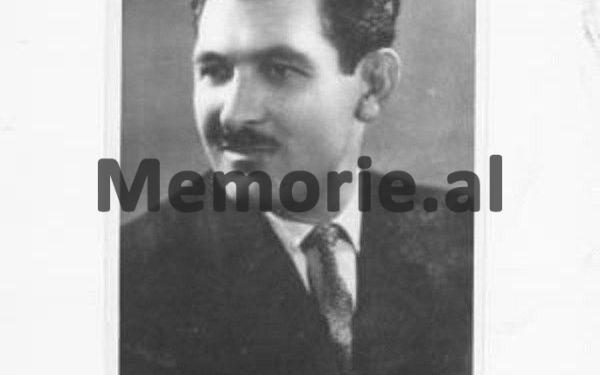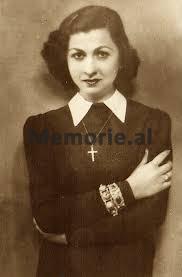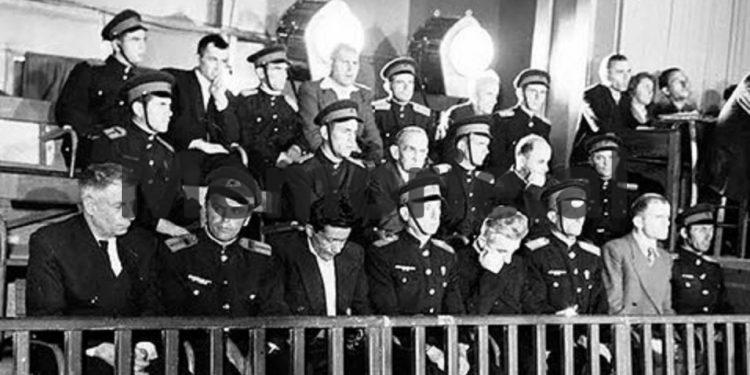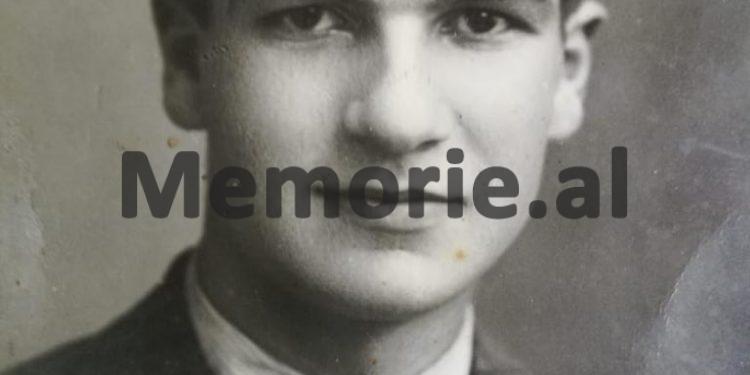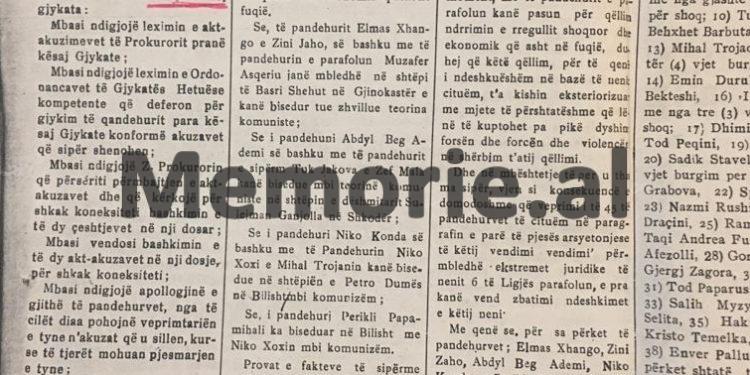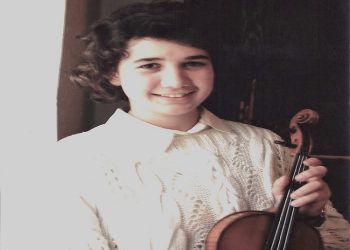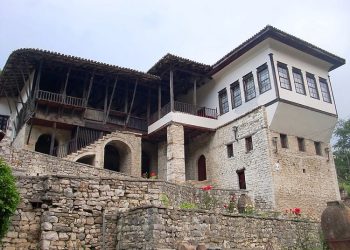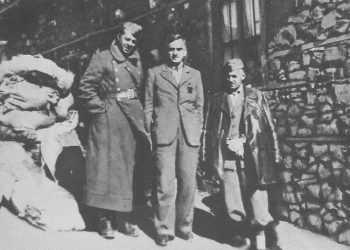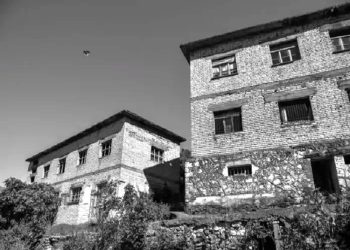Dashnor Kaloçi
Memorie.al publishes the unknown story of the family of a prominent lawyer and publicist, Vasil Dilo, originally from Gjirokastra, who after graduating in law from the Ottoman capital in Istanbul, returned to where he opened the Omonia newspaper. in the city of Gjirokastra and then another newspaper, Tirana, where for years those press bodies became ardent defenders of the Albanian cause, against the intentions of the Greek circles for the so-called problem of North Epirus.
The relocation of Vasil Dilo’s family from Gjirokastra to Tirana during the period of the Zog Monarchy, where Vasil, in early 1939, instigated by his son, Koco, admitted to being a lawyer in the famous Qemal Stafa trial. , defending Zef Mala, leader of the Communist Group of Shkodra, and then his daughter, Melpomeni, on April 6, 1939, was the only woman to go to Skanderbeg Square where volunteers were leaving for her. went and fought in Durres against Italian fascist aggression. Kocho Dilo’s rare testimonies about the period of occupation of the country, where he along with his four sisters: Melpomen, Xanthipi, Efgenia, and Eleni, as well as two other brothers, Telemak and Gaqo, engaged with communist groups in the city of Tirana and the Anti-Fascist Movement, as well as the meeting Koco had with Enver Hoxha in 1942, when his close friend Koco Tashko introduced him to the “Flora” store at the beginning of Debar Street.
Kocho Dilo’s disillusionment with the communist regime since 1945 when he was appointed Chairman of the State Commission for the Detection of War Criminals in the city of Shkodra after he saw with his own eyes the unprecedented terror exercised against him those whom he regarded as “enemies of the people”, which led to him being removed from that position and returning to the profession of lawyer and to run for deputy outside the Democratic Front, which also led to his arrest, and of his brother, Telemachus, who suffered for some time in the political prisons of that regime after having previously experienced inhumane torture in the cells of the investigation. Koco’s release from prison following the conviction of Koci Xoxes and his return to his former profession by attending several notable trials such as Attorney Et’hem Chakos or the Navy’s Vice Admiral Teme Sejko to come in 1965-, where he would be interned in the villages of Lushnja, after Enver Hoxha had earlier abolished the Ministry of Justice, saying that “We do not need lawyers like Koco Dilo, as the Party itself decides justice”!
“My home on Debar Street became one of the strong bases of the War, where many of my Communist comrades came and took refuge. Here in this room where we are now, we have been discussing with Koco Tashko for hours about the murder of Qemali and Vasil. One of my close friends was Koco Tashko, who was a great intellectual and democrat, with great courage and heart. In 1942, it was Kocho who first introduced me to Enver Hoxha, his only major mistake and major blame, was that knowing Enver Hoxha well, as a regular waggoner when they were together in Korça, he went and took it to the meeting of the creation of the Albanian Communist Party on November 8, 1941, at a time when Enver knew no one for communist. When I first met Enver at the Flora store, after introducing him to Koco, he gave me the impression of an ordinary man, and his only good side was the appearance. ” This is how the famous lawyer Koco Dilo remembered his first and last meeting with Enver Hoxha. Who was Koco Dilo, and what was his past, from what family did he come from, and why did Enver take that example at that meeting?
Father, Basil, lawyer, and publicist
Koco Dilo was born in the city of Gjirokastra in 1916, into an intellectual family, where his father, Vasil, grandfather, and uncle, had completed their studies in Jurisprudence in the capital of the Ottoman Empire, Istanbul, and they were known as the best lawyers. At that time, not only in Gjirokastra but throughout the country. His father, Vasili, besides becoming a lawyer, had also become widely known as a publicist and patriot, writing dozens of articles in the press at the time defending the rights of the Albanian state from the greed of Greek chauvinists. at that time. Thus in 1913, after the fall of the Vlora government, Basil, after many attempts, managed to open a newspaper in his hometown of Gjirokastra, which he named “Omonia”. In that newspaper which came out in two languages, Albanian and Greek, at the top of it all came the phrase, “Allah made us free and we must live free.” Although the newspaper that produced Vasil Dilo was named “Omonia”, it had no connection with the Greeks but was quite the opposite. It was one of the organs of the Albanian press that fought most against the Greek chauvinist circles, which raised their claims about the so-called Vorio-Epirus problem. For this reason, the Greek authorities intervened and Vasil was interned for some time in Tepelena district. During the Vlora War in 1920, in a piece published in the newspaper “Omonia”, Basil addressed the Greeks, among other things, saying: “Why do you cling to a palm that does not belong to you? The road to Athens crosses from Vlora. Why don’t you go to fight in Vlora ”. In 1920, Vasili moved from his hometown of Gjirokastra and settled in Tirana, without giving up his publicity activity, where he opened another newspaper called Tirana, which became a refuge for many Albanian patriots who held the side of the most progressive politics and ideas of that time. All of Vasil’s children (Melpomeni, Gaco, Xanthipi, Efgenia, Telemachus, Eleni, and Koco) also tried to resemble their father, both in education and intellectual training, as well as in their patriotic feelings. So on April 6, 1939, when many young volunteers gathered on Skanderbeg Square, who boarded trucks to go and fight in Durres, the only girl among them was Melpomeni Dilo, who worked as a nurse. After the war ended, she worked for the establishment of the Gynecological-Observatory Service in Albania as a nurse and was never given the place she deserved for what she had given during the war.
Koco graduates in Athens
After settling in Tirana, Vasili tried to educate his children in European universities, and the first of them was Koco, who was noted for his high school results. So at a young age, Basil sent Koco to attend a school on the island of Corfu. After graduating from high school in 1932-’36, he completed his undergraduate studies at the Athens University for Jurisprudence, graduating with very high scores. After graduating in 1942, Koco returned to Tirana where he worked for nearly six months as a lawyer. Earlier, since he had been on the banks of the University of Athens, influenced by his professors, he had come into contact with communist ideas and returned to Albania, restoring ties with his former close friends, such as Zef Mala, Qemal Stafa, Vasil Shanto, Nonda Papuli, Lefter Kristo, etc. So in 1939, when this group appeared before the Zog Monarchy charged with its communist activity, Kocho influenced his father, Vasili, who agreed to be Zef Mala’s lawyer, chairman of that group. communist. As the law service was not functioning at the time, Koco was forced to relocate to Tetovo and in that city he became closely associated with the Anti-Fascist Movement, actively participating in the establishment of the first National Liberation Council for Tetovo, along with Qemal Agolli, Osman Tetova, etc. For his anti-fascist activity, he is expelled from Tetovo and forced to return to Tirana, where he continued to practice his profession of lawyer.
Meeting with Enver Hoxha
Given the engagement of the entire Dilo family (all four sisters and three brothers) with communist groups and the Anti-Fascist Movement, Koco Dilo had the opportunity to meet with Enver Hoxha as well and recalled: “When I returned to Tirana, I got in touch with my Communist comrades after Qemal Stafa was killed with Vasil Shanton and many others were arrested or interned. My home on Debar Street became one of the strong bases of the War, where many of my Communist comrades came and took refuge. Here in this room where we are now, we have been discussing with Koco Tashko for hours about the murder of Qemali and Vasil. One of my close friends was Koco Tashko, who was a great intellectual and democrat, with great courage and heart. In 1942, it was Kocho who first introduced me to Enver Hoxha. his only mistake and great blame were that knowing Enver Hoxha, as an ordained vagabond, that at the time they were together in Korça, he went and took it to the meeting of the creation of the Albanian Communist Party at 8 November 1941, at a time when Enver knew no one as a communist. When I first met Enver at the “Flora” store, after introducing Koco to him, he gave me the impression of an ordinary man and his only good side was, outward appearance, “Koco recalled at the meeting. with Enver Hoxha, who is 1965, as for all the Albanian people, would be the destroyer for him and the whole Dilo family.
Removal of Koco from Shkodra
After the end of the war, Koco Dilo was assigned to go to the city of Shkodra, appointed as Chairman of the State Commission for the Detection of War Criminals. He remained in this position for no more than six months, as he moved to the city of Berat. The reason Kocho was dismissed from office as that he was strict in law enforcement, stumbling upon the great terror being waged against the anti-Communist resistance in that city, where several units of the People’s Defense Division were operating in an extensive operation led by Mehmet Shehu. Concerning this, Koco recalled: “While I was in Shkodra, the Tracking Forces arrested Padre Anton Harap and brought me to my office. I didn’t let anyone touch Paddy Anthony’s hand as long as he stayed there. Although a member of the Regency, Padre Anthony was a great clergyman and patriot. During the conversation I had with him, he addressed me, saying: With the blow to the Catholic Clergy, Albania was losing two of its strongest penalties, Dom Lazar Shantoja and Dom Ndre Zadeja. ”
Independent MP arrested
Even in the city of Berat, during all those years of his stay there, Koco maintained a very correct attitude, not abusing political trials. For this position, he is fired as a judge and forced to return to the family in Tirana to practice law again. Concerning this, Koco recalled: “At that time I felt very disappointed because they were not the communist ideals that we stood up for and fought for. The power that was held by our comrades of the ideal was degenerating into the power of terror. ” Thus, in 1947, seeing the situation created, Koco tries to distance himself from the communist power and puts forward his candidacy by running as an independent MP. After that, he and his family also began to feel a lot of pressure and psychological terror, forcing him to withdraw his candidacy. Six months after he withdrew his candidacy in September 1947, Kocho was arrested on charges of “hostile activity against communist power”. The main reason for his arrest was his candidacy for an independent MP outside the “Democratic Front” and his stay in Shkodra and Berat. After a year and a half in the investigator, subject to the most inhumane torture, Koco Dilo was able to be released from prison by taking advantage of an amnesty granted by the then communist government of Enver Hoxha. This was made possible after the elimination and death sentence of Interior Minister Koci Xoxe, where what happened in the history of the Party of Labor of Albania is known as the “Turn of the Party”, where about 160 different intellectuals who were released graduated from Western universities and were arrested as “enemies of the people” and Enver Hoxha was found guilty of all that by Koci Xoxen. But as Kocho Dilo was released from prison, his brother, Telemaku, an intellectual well known at the time who had graduated abroad for History and Geography, and had been arrested since 1946 (as a sign of pressure on Kocho) had emerged as a candidate for MP outside the Democratic Front), continued to serve his sentence as a political prisoner in the terrible camp of Vlocisht in the Devolli area of Korça.
Lawyer of Tema Sejko
After 1949, upon his release from prison, Koco practiced his profession of a lawyer until 1966, when the communist regime overthrew the Ministry of Justice. During those years, he took over the defense in several trials of many political opponents or victims of Enver Hoxha’s communist regime. So in the early 1950s, he took over the defense of Et’hem Chako and two of his accomplices who had been parachuted into Albania by the American Intelligence. Likewise in 1961, Koco Dilo was assigned and admitted to being a lawyer in the famous trial of the “Cham Conspirators” where he defended the counter-admiral of the Navy, Major-General Teme Sejkon. In that mounted political trial, through questions put to him by Costa Fili’s witness, Koco Dilo, he indirectly exposed not only him as an ordinary fraudster, but also the whole farcical and mounting process. In this connection, he recalled: “Costa Fili was brought to trial for allegedly testifying as Teme Sejko’s interlocutor with foreign discoveries, mainly Greek ones. But in fact, he was a mentally ill man who had lived in Greece, and a Greek, with whom he was working in Ioannina, to drive him away, lied to him that he had wiped a gold jar somewhere in a place in The neck of Muzina and sent him to Albania giving him a map with him. Costa as easy as he was, really believed the thing and upon arriving in Albania, he was captured by the Border Guard forces and forced to cooperate with the State Security Bodies which they used as they wanted to bring him there. trial. For those services he did, Kostas was spared his life and was not executed like most of the so-called “Cham conspiracy group”, but was sentenced to 25 years, what was the maximum punishment then, and when it came out, the Communist state itself sent him back to Greece, repatriating him, and if he kept him here, people would be surprised that he was already the liaison of Teme Sejko with Greek agents. ”
Enver Hoxha, we don’t need Koco Dilo anymore
During those years as Koco worked as a lawyer, he had a close friendship with Minister of Justice Bilbil Klosin, who said: “Bilbil was a righteous man and we talked freely about subtle problems. I remember talking about the Prosecution problem. In recent years, Albanian advocacy has been nothing but a facade and a mask under which the Communist regime was hiding its true face, against genuine anti-Communist dissent. In 1965, during a visit to the People’s Republic of China, an Albanian government delegation headed by the Minister of the Interior, Kadri Hazbiu, and the Prosecutor General, Aranit Çela, Enver Hoxha, immediately called for an urgent meeting, the Central Committee Secretariat of the APL, and the Political Bureau. According to the suggestions of the “Chinese comrades”, that at the beginning of his speech, Enver Hoxha announced and announced the abolition of the Ministry of Justice, because justice in Albania was decided by the Party itself. In his speech to the Political Bureau and the Central Committee of the ASP, among other things, Enver Hoxha said: “We need lawyers like Koco Dilo and Suat Asllani.” Just days after that meeting, Koco Dilo was accused of being a “bourgeoisie and defender of Albania’s enemies” and was interned with his family in Grabjan village of Lushnja. After his deportation, his two brothers, who were well-known intellectuals in the city of Tirana, were fired. In that internment camp, the Dilo family stayed for eight years, and Koco was forced to work hard in agriculture until 1973 when the sentence expired by the Central Committee on Internally Displaced Persons headed by Manush Myftiu expired.
He died in Tirana in 1996
After the end of the internment, in 1973, Koco and his family returned to Tirana, where he was left without a job and in a very difficult economic situation since his entire family lived on only a pension of ALL 3,600. old per month. His wife was sent to wash cars in the Automobile Park, being the only woman in Albania to work as a carpenter and there she suffered a serious illness from the difficult conditions in which she worked. After the fall of the communist regime, Koco Dilo, though at a young age, once again returned to the law profession, more for passion than for financial gain. Being a good connoisseur of several foreign languages, he also did many studies and various translations in the field of Jurisprudence, which he published in the press of the time. Famous lawyer Koco Dilo passed away in 1996 after enjoying his freedom, once again, of his profession, which brought him so many lifelong experiences./Memorie.al




